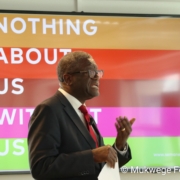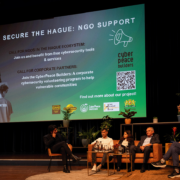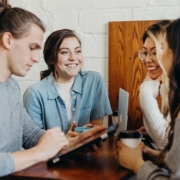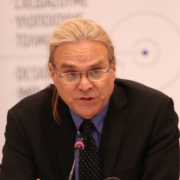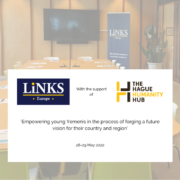“Talking about Inclusive Facilitation”
Every six weeks or so, the peer-to-peer group on “Facilitation” at the Humanity Hub picks a new host to introduce a topic of mutual interest and learning. In our most recent edition, hosted by Job van der Poel from The Hague Academy, a group of Humanity Hub members explored the topic of ‘Inclusive facilitation’. What does it mean? And why is it important to think about?
The host of the Humanity Hub’s most recent peer-to-peer group on facilitation, Job van der Poel reflects on inclusive facilitation.
We often find that organising a training, workshops, or seminars, whether digital or in person, has a ‘standard operating procedure’: we pick a topic, organise some speakers and content and start to invite participants. Often however, we forget to think about how inclusive our activities really are. How easy is it for persons with a disability to join in our sessions? What barriers have we (un)consciously put in place?
The facilitation needs of persons with a hearing or sight impairment may vary from others. By not taking their needs into account, we unintentionally exclude up to 15% of our target audience from our activities. During the peer-to-peer group discussion we looked at some of the different obstacles people may face, and what potential avenues we can look into for furthering knowledge and understanding.
Barriers to ‘Inclusive Facilitation’
These often manifest themselves in one of three ways.
- People and/or organisations have inadequate data, statistics and evidence on the need of inclusive facilitation.
- People and/or organisations lack awareness on how to accommodate participation of people with disabilities.
- People and/or organisations have prejudices, misconceptions or inaccurate concerns over cost/difficulty of disability inclusive facilitation.
By laying the topic on the table, individuals with organizations can challenge and address these barriers. The group discussed some easy pointers that help overcome these barriers:
- Know your audience and prepare your activity accordingly
- Don’t assume, but ask people about their needs
- When selecting a venue to time: think about the accessibility
- Make sure communication is accessible (do you need translation?) and allow sufficient time for all participants to respond
At The Hague Academy for Local Governance, we are involved in a programme called We Are Able! This programme focuses on strengthening government and civil society’s awareness and capacity to include the needs of people with disabilities. The goal of these inclusive practices is to promote food security for people with disabilities. You can find out more about the programme at their website: weareable.ngo.
—
For the next P2P session on 3rd May 2022, Kelly Buis and Matt Barnaby from ImpactBasis will look at the challenging topic of ‘facilitating uncomfortable conversations’.
Do you ever admire someone for making a courageous decision? Good news – everyone can train their courage muscle! One of the steps in doing so is to engage in difficult and uncomfortable conversations, even if avoiding them seems a way more attractive choice.

